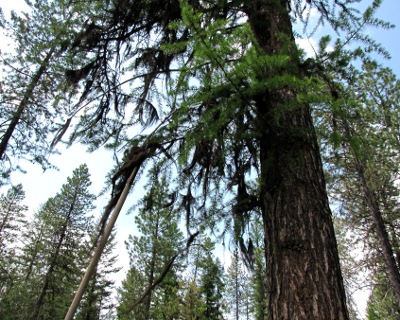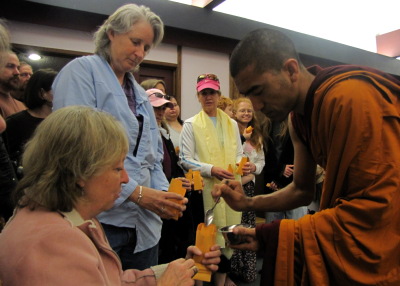Camas - itx̣ʷe - Cammassia quamash
Thursday, June 30, 2011
Wednesday, June 29, 2011
Feeling Good
Dakota recently performed a powerful rendition of Feeling Good at his grandmother's 70th birthday party. His vocal quality just keeps getting better. Watch the video below and judge for yourself:
Monday, June 27, 2011
Wildflowers
I love wildflowers. They follow their own seasons apart from the demands of human timetables. But they also stand as markers within the natural cycle of life. If we pay attention, they orient our lives to the subtle progression of earth-changes. They offer yet another window into deep nature awareness.
These particular flowers have all presented themselves to me within the last few weeks.
| Wild roses... |
| Some kind of wild daisy... |
| A yarrow flower catches the sunset. |
| A wild iris... |
Pit Oven
Over the last few weeks, my family has gathered Indian food - black moss, brown camas, and wild onions - to cook in a traditional pit oven. This is the second year we've done this as a family, apart from the community culture camp. In the big picture, we're all still 'students' of the old ways, but I have to say that connecting to these ancestral technologies is a very fulfilling experience.
My family once used this method of cooking as a central part of their livelihood, but the practice has since fallen by the wayside of history. My great grandmother Lizzie Homer Moses was pit cooking at their home on Reservation Road until the early 1960s, possibly as late as 1964. My grandfather's family used this process until the 1970s. My friend Francis also remembers cooking for his grandmother until the 1970s.
Pit cooking was revived five years ago as part of the Wellpinit School culture week. And then last year my family also returned to this method of food preparation.
It was important for me to involve my children. They participated as we prepared the food and dug the pits. They also observed all the various stages of the cooking process. Perhaps someday they will come to appreciate the beauty of this experience and then teach their children.
This process is an important part of our spirituality. This aspect of the process is intensely personal, and I might not even share this fact, except that I see an urgent need for our communities to re-connect to nature and earth-based processes. We have become so dependent on modern comforts and technologies that we are slowly disconnecting from one another and from ourselves. A great many social maladies are healed when we simply get our hands dirty and work together in nature. Over a period of three days, this simple earth oven brought together dozens of individuals, children, and elders within a common cultural experience. Families were strengthened and our connection to the earth was deepened.
| Cleaning the moss. Wild onions are visible inside the yellow bin. |
| The children also helped clean the moss. |
| The food was bundled inside cotton cloth just prior to being placed in the oven. |
| The camas in its raw state is white with onion-like layers. |
| The cooked camas turns sweet and dark brown. |
Sunday, June 26, 2011
Camas
Last Sunday, my friend and I dug camas near Spangle, Washington, in a place where my family has harvested roots for generations and has maintained a positive relationship with two generations of landowners. I only recently came to discover that place, but I have fallen in love with beauty and history of the plants.
When we arrived, we were greeted by mulesear sunflowers in full bloom (Wyethia amplexicaulis).
A lone whitetail deer walked toward us, seemingly undisturbed by our presence.
It was a beautiful, perfect day for gathering camas.
Saturday, June 25, 2011
Found
My small camera was misplaced several weeks ago, but yesterday I found it again. In a way, I enjoy finding my camera after a long time away; it's almost like a miniature time capsule. These images were on the memory card.
Patrick and Dena took me to a new place to dig bitterroots.
I visited Little Falls with my friend Tim.
That same day, we found a patch of arnica flowers that had turned white like dandelions.
Sunday, June 19, 2011
Gathering Moss
Last Friday, our Salish class convened in a grove of tamarack trees to gather black moss.
The day began with a light drizzle, but by the end of the afternoon, the blue sky appeared.
We took turns pulling the moss with a long hook.
After collecting the moss from the trees, we all stood together and cleaned the moss from the fallen branches.
The goal of our class was to continue the tradition of our ancestors, but we also enjoyed a few light-hearted moments of joking and laughter.
Saturday, June 18, 2011
Firefly
My nieces Melanie, McKenzie, and Madelyn have their own band, Firefly. Based in Gilbert, Arizona, they have opened for Martina McBride and LeAnn Rimes. They have also performed a preshow for Justin Bieber. They recently performed a free concert in Spokane for their grandmother's 70th birthday.
This video is a tribute to fathers.
Sunday, June 12, 2011
Sand Mandala
Part Two
The monks destroyed the sand mandala as a metaphor of the impermanence of life, then distributed half the sand to the audience. The other half is traditionally poured into a nearby body of water. In this case, the monks went to the Spokane River and deposited the sand into the falls near Canada Island.
On the left side of this image is the Venerable Tenzin Thinlay who acted as translator.
As part of the ceremony, prayers were offered in the Spokane language to respect the ancestors and the river.
Ven. Tritul Jampa Kalden poured the sand into the river.
Saturday, June 11, 2011
Sand Mandala
Part One
The Unity Church of Spokane hosted the creation of a sand mandala by a travelling group of Tibetan monks.
"Sand Mandalas are unique to the Tibetan culture, they are believed to affect purification and healing. They are created by hand and embody traditional meditative designs that represent the universal qualities of harmony, balance, community, and pure wisdom."
There are many types of mandalas, but this particular design is known as the Mandala of Compassion.
"In general all mandalas have outer, inner, and secret meanings. On the outer level, they represent the world in its divine form; on the inner level they represent a map by which the ordinary human mind is transformed into enlightened mind; and on the secret level they depict the primordially perfect balance of the subtle energies of the body and the clear light dimension of the mind. The creation of a sand painting is said to effect a purification on these three levels.
"For centuries, Tibetan mandalas were seen exclusively by the monks and nuns of Buddhist monasteries. In 1988, however, the Dalai Lama, the spiritual leader of Tibetan Buddhism, decreed that a mandala be constructed for the public to witness."
From left to right, the Venerable Tritul Jampa Kalden, the Venerable Geshe Tenzin Choephel, and the Venerable Geshe Tenzin Dhargye. In 1987, Ven. Tritul Jampa Kalden was recognized as the 6th incarnate of Gaden Tripa Ngawang Choekyi by His Holiness the Dalai Lama.
"Traditionally, most sand mandalas are destroyed shortly after their completion. This is done as a metaphor of the impermanence of life."
Half the sand is swept into an urn while the other half is distributed to the audience. The Venerable Tenzin Thinlay translated much of the event and distributed the sand.
All quotes in this post are from a flyer made available at the event.
Thursday, June 09, 2011
Tony Ten Fingers
Tony Ten Fingers was invited by Twin Eagles Wilderness School to speak about Earth-Based Cultural Restoration during a weekend event at Scotia House. Tony is Oglala Lakota from the Pine Ridge Reservation of South Dakota, and draws from the original teachings of his people. Throughout the weekend, he spoke of the great need for modern people to re-connect to the earth and to our respective ancestral traditions.
Scotia House is a perfect place to connect with nature, and the weather was perfect for gathering outdoors.
These events also provide a wonderful opportunity to connect with one another. Many of the people who attended have participated in previous events. The connections deepen over time and create a level of trust that allows for what I call a heart-opening. Laughter comes easily, and sometimes tears.
Tim and I stand with Tony.
Wednesday, June 08, 2011
Tawnya's Song
Jim Boyd sang a touching tribute to his niece Tawnya who recently passed after fighting 'that bad sickness' cancer. Shelly Boyd and her family asked me to post Tawnya's Song in the hopes of getting more than 10,000 hits before her birthday next Monday (as of this morning, the video had a little more than 8,400 hits). Of course, after losing my aunt to that sickness, I agreed to help. I understand that for many people, telling the story is a healing experience, and now their family wants you to hear the story.
Won't you support their healing by watching the video and sharing it with your friends?
Thursday, June 02, 2011
Prayer Flags
My co-worker Carole is a creative genius. She often comes into work with some new, brilliant idea for an original art project. Most recently, she envisioned a series of flags, modeled after Tibetan prayer flags, for a colleague who has taken ill. She enlisted dozens of co-workers to each create a flag with an individual, personalized message. Some of the flags contained simple messages of encouragement, while others returned with intricate drawings and designs.
Carole's project has inspired the faculty, brought comfort to a friend, and raised the creativity quotient throughout the entire Institute for Extended Learning.
Wednesday, June 01, 2011
Storm
The AEC parking lot nearly flooded this evening beneath a torrent of rain and hail. It's rare to see such heavy rain in Spokane, but the weather has been strange all over.
Hail mixed with rain accumulated in spontaneous streams across the asphalt.
Black thunder clouds moved toward the northeast while cars splashed through rivers of water that instantly formed along Monroe Street.































